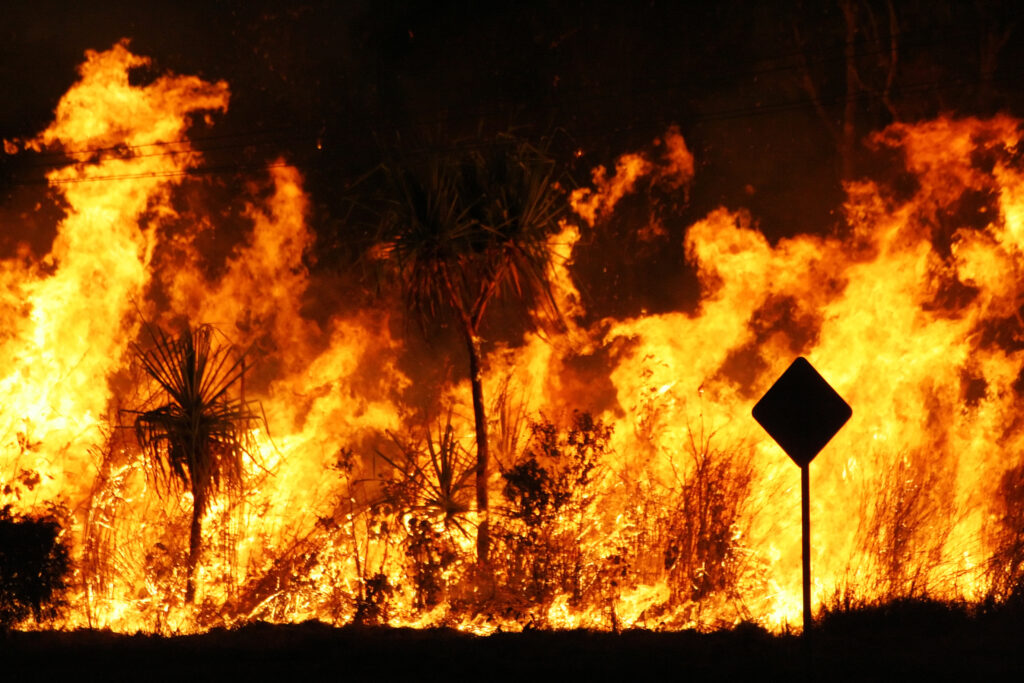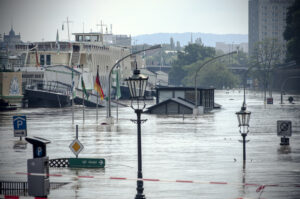
Bush fire in Australia
World Humanitarian Day feature post by Priliantina Bebasari, Chris Northey and Jo-Hannah Lavey – Consultants with Alinea Whitelum, Alinea International’s development consultancy service in Australia.
We are not all in the same boat. We are in the same storm. Some are on super-yachts. Some have just one oar. – Damian Barr, Writer, Broadcaster and Host
Throughout 2020, this quote was posted and shared across social media networks as a comment on widening global inequities, and a response to some early thinking – or hoping – the COVID-19 pandemic would be an equalizer. This quote resonates today as fear and uncertainty unfold in Afghanistan with the Taliban taking control of the country, and in the compounding suffering seen around the world due to climate change – the 2021 World Humanitarian Day theme.
The Intergovernmental Panel on Climate Change report released in early August predicts we will exceed an 1.5°C global temperature rise in just two decades.

Flooding in Germany
The findings from this report come amid an increased frequency of disasters in many parts of the world, including bush and forest fires in Australia, North and South America, Turkey and Siberia; massive floods in Germany, Belgium, China and Turkey; intense tropical cyclones in the Pacific Island countries and Indonesia; locust invasions in Ethiopia, Kenya, Somalia, Sudan, Eritrea and Yemen; and more. This report also affirms that human activity is the primary cause of climate change. No country, including the wealthiest, is immune to human-induced climate-related disasters.
What do these findings mean for the humanitarian world?
Climate change, combined with the COVID-19 pandemic, are increasing humanitarian need and driving changes across the sector. Responses to conflicts in Syria, Yemen and Afghanistan incorporate COVID-19 safe practices; further stretching limited resources. Lockdowns and travel restrictions limit the movement of international staff. Therefore, local civil society organisations increasingly deliver aid. While this brings more responsibility and influence to some local actors over humanitarian assistance provided, it can increase their exposure to risk. It may also be one of the reasons the percentage of national aid worker victims of violence was higher than usual in 2020 – another factor that requires attention from the international community amid changes underway.
However, these changes are not intentional or reforming the humanitarian sector. There have been advances to localisation since The Grand Bargain – a unique agreement signed in 2016 between major donors and humanitarian organisations working to close the humanitarian financing gap. However, these advances do not go far enough. While more crisis-affected people influence local and national responses to climate change impacts, we argue this is borne of necessity due to lack of access. It is not the result of the international community taking intentional action towards transferring power to local actors. As our colleagues Thomas Hehir and Leone Tupua so succinctly wrote in DevPolicy, “If a disruption the size of COVID-19 does not force us to change our approach, then it is clear the status-quo will be maintained indefinitely unless we choose otherwise.”
How humanitarian institutions, including donors, view “humanitarian response” needs a rethink. Far from being an equalizer, the COVID-19 pandemic deepened global inequities, already profoundly evident in poverty, injustice, conflict, as well as the impacts of human-induced climate change. It also forced humanitarian organisations to pivot their systems and processes from business-as-usual to local responses determined by crisis-affected people.
In many ways, climate change and the COVID-19 pandemic are forcing a reckoning across the humanitarian system and demanding urgent sector reform. As we call on governments to heed climate science and urgently address global warming, we must examine the role of the humanitarian ecosystem and unpack and transform the unequal power relationships that have defined it. Amid calls to act on human-induced climate change, calls that are more urgent than ever, now is the time to reflect on the changes brought by the COVID-19 pandemic and apply those learnings to how the humanitarian sector addresses climate action.
On World Humanitarian Day, we are reflecting on the importance of intentionality. If we do not move from rhetoric to action, we risk tokenism rather than transformation as the impacts of climate change increase our need for locally-led crisis and disaster response.
